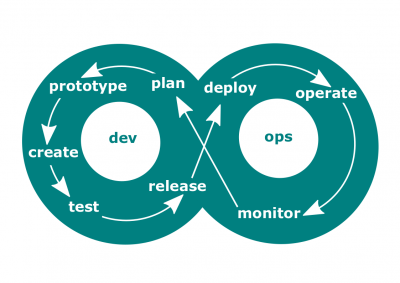Difference between revisions of "DevOps"
(→See also) |
|||
| (4 intermediate revisions by the same user not shown) | |||
| Line 4: | Line 4: | ||
Functions of ''DevOps'' can be compared with those of [[project management office]] ([[project management office|PMO]]) in a traditional [[project management]] framework. ''DevOps'' can be considered as an application of [[continuous delivery]]. | Functions of ''DevOps'' can be compared with those of [[project management office]] ([[project management office|PMO]]) in a traditional [[project management]] framework. ''DevOps'' can be considered as an application of [[continuous delivery]]. | ||
| + | |||
| + | A group of ''DevOps'' concepts had been existing for a while before the ''DevOps'' term emerged. Recently, those concepts have catalyzed into a movement and are rapidly spreading throughout the technical community. | ||
==Definitions== | ==Definitions== | ||
| − | According to [[ | + | According to the [[ITIL Foundation 4e by Axelos]], |
| − | :[[DevOps]]. | + | :[[DevOps]]. An organizational culture that aims to improve the flow of value to customers. DevOps focuses on culture, automation, Lean, measurement, and sharing (CALMS). |
==Inspiring quotes== | ==Inspiring quotes== | ||
| Line 17: | Line 19: | ||
==See also== | ==See also== | ||
| + | *https://www.atlassian.com/devops/devops-tools | ||
===Related lectures=== | ===Related lectures=== | ||
:*[[Operations Management Quarter]]. | :*[[Operations Management Quarter]]. | ||
| − | :*[[DevOps | + | :*[[What the DevOps Is]]. |
| − | [[Category: Septem Artes Administrativi]][[Category: CNM Cyber Orientation]][[Category: Articles]] | + | [[Category: Septem Artes Administrativi]][[Category: CNM Cyber Orientation]][[Category: Articles]][[Category: Information Technology]] |
Latest revision as of 17:54, 5 May 2021
DevOps is an engineering practice and a set of concepts based on that practice that aim at unifying new product development (the Dev part) and operations (the Ops part). The primary feature of DevOps is to strongly advocate automation and monitoring at all steps of the project such as integration, testing, releasing to deployment, and infrastructure management.
DevOps aims at shorter development cycles, increased deployment frequency, more dependable releases, in close alignment with business objectives. DevOps processes refer to a sequence of phases of DevOps; DevOps toolchains refer to a set of tools used in that process.
Functions of DevOps can be compared with those of project management office (PMO) in a traditional project management framework. DevOps can be considered as an application of continuous delivery.
A group of DevOps concepts had been existing for a while before the DevOps term emerged. Recently, those concepts have catalyzed into a movement and are rapidly spreading throughout the technical community.
Definitions
According to the ITIL Foundation 4e by Axelos,
- DevOps. An organizational culture that aims to improve the flow of value to customers. DevOps focuses on culture, automation, Lean, measurement, and sharing (CALMS).
Inspiring quotes
- Simply put, things always had to be in a production-ready state: if you wrote it, you darn well had to be there to get it running!. --Mike Miller
- The most powerful tool we have as developers is automation. --Scott Hansellman
- The key in such a transition to continuous delivery is to expect things to get worse before you’ll be able to make them better. --Mattias Marschall
- Currently, DevOps is more like a philosophical movement, not yet a precise collection of practices, descriptive or prescriptive. --Gene Kim
